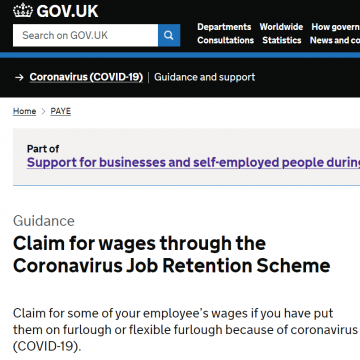Long Covid – guidance from an HR perspective
Blog post

As the Covid-19 pandemic continues, there has been an increasing awareness of long covid, the phenomenon where some individuals who contract Covid-19 go on to experience debilitating symptoms for weeks or even months. In this article we explore what this means for employers and the HR implications of dealing with employees with long Covid.
What is long Covid?
There is no common definition of long Covid. How long after the initial illness symptoms need to persist to be categorised as long Covid depends on who you ask.
How long might it last?
We don’t know the answer to this question but we know that some people have suffered symptoms for over 12 months and are still suffering.
The NHS website states "Many people feel better in a few days or weeks and most will make a full recovery within 12 weeks. But for some people, symptoms can last longer."
How does it present?
For some it may present as a continuation of their original symptoms, for others there can be a period of recovery followed by a subsequent decline in health.
What are the symptoms of long Covid?
The NHS has listed common symptoms of long Covid as follows:
- Extreme tiredness (fatigue)
- Shortness of breath
- Chest pain or tightness
- Problems with memory and concentration ("brain fog")
- Difficulty sleeping (insomnia)
- Heart palpitations
- Dizziness
- Pins and needles
- Joint pain
- Depression and anxiety
- Tinnitus, earaches
- Feeling sick, diarrhoea, stomach aches, loss of appetite
- A high temperature, cough, headaches, sore throat, changes to sense of smell or taste
- Rashes.
However there are also more complex consequences for some people.
The Centre for Disease Control and Prevention says: "The multi-organ effects can affect most, if not all, body systems including heart, lung, kidney, skin, and brain functions. Multi-organ effects can also include conditions that occur after COVID-19, like multi-system inflammatory syndrome (MIS) and autoimmune conditions… It is unknown how long multi-organ system effects might last and whether the effects could lead to chronic health conditions… Effects of COVID-19 treatment and hospitalisation can also include post-intensive care syndrome (PICS), which refers to health effects that remain after a critical illness. These effects can include severe weakness and post-traumatic stress disorder (PTSD). PTSD involves long-term reactions to a very stressful event."
In an article published by the BBC, it was said that at the UK’s first post-Covid clinic at University College London Hospitals 80% of the patients experienced “deadening fatigue”.
What treatment is available?
Given the wide range of symptoms the treatment available is wide and varied, however long Covid is a new condition and not much is known. Research is being undertaken across the world to identify viable treatment options, but at the moment there is no mainstream treatment path for clinicians to follow and results are not guaranteed.

What does all of this mean for HR practitioners handling long-term absence?
The best advice we can give is to keep a very open mind about the cause of the absence that you are handling, how it can be treated and how long it might impact upon a person’s capability for work.
Does a long Covid case need to be treated differently to any other case?
Clearly the prognosis for the future in a long Covid case may be very uncertain, but that is also the case in many cases of long-term ill health. Many of the cases which end with a review of employment are those where the absence has lasted a long time (e.g. 12 months) and there is no certainty as to when a person will be well enough to return to work.
There is no compelling case to suggest that the treatment of a long Covid absence case would require any different handling from a process perspective than any other long term absence case.
We set out at the end of this article the key considerations when handling cases of long-term absence.
However, we do believe that there is one difference to take into account when handling a long Covid case and that is in terms of managing expectations. The national effort in handling the pandemic and the myriad of measures that have been put in place to support people during the pandemic may generate an expectation that there will be further support available than would normally be the case when handling long-term absence. These may manifest themselves in terms of requests for extended sick-pay or requests for longer periods of tolerance before employment is reviewed.
Should we extend sick pay?
There is no obvious reason to treat all long Covid absences differently from other long term absence cases from a sick pay perspective. But each case must always be treated on its own merits according to individual circumstances.
Many co-operatives have extended sick pay in certain circumstances unrelated to Covid. These are most usually where there is a particular reason to do so. For example, in serious workplace accident cases where the employer feels some responsibility for the employee’s absence. Also, we see cases where the prognosis for the employee is so poor that they have been advised that they are not expected to live very long. These are the two most common circumstances where sick pay is extended.
There are some parallels which many employers may draw in a long Covid case, for example where the case involves a key worker exposed to the virus at work.
Should we allow a longer absence than normal?
There is similarly no reason to delay handling a long Covid case compared to any other long-term absence, again subject to the requirement always to look at the individual circumstances of the case.
Extending the period over which you would normally review cases would be an exercise of discretion which you might choose to undertake in similar circumstances to those discussed above concerning sick pay.
Many employers have chosen not to apply their normal absence triggers that apply to short-term intermittent absence through ignoring Covid related absences. Again, it is a matter of discretion to be exercised according to the circumstances.
Will long Covid be considered to be a disability?
It certainly has potential to be. If it is preventing work then it will be in the territory that might be considered ‘substantial’. Key to whether or not it will meet the definition of a disability under the Equality Act 2010 will be whether or not it will be “long-term”. That will depend on whether or not it has lasted for 12 months or is likely to. That will depend, in the latter case, on the prognosis for the future. A specialist report or occupational health referral is usually the best route to consider that question.

Key considerations in handling any long-term absence cases
Most employers will classify an absence as long term once it has extended beyond four weeks. At this point, it is important that you:
Maintain contact – agree how you will communicate with your employee and how they will update you on any changes to their condition. Arrange welfare visits to discuss their condition, the likelihood of their return to work in the near future, and whether there is anything you can put in place to assist that return to work.
Seek additional medical information – in most cases of long term absence it will be important to seek further information in the form of either a medical or occupational health report. This will help you to understand the likely duration of the employee’s absence and to identify whether there is anything that you can do to assist the employee to return to work. Remember that you will need to gain the employee’s consent to seek this information.
Consider making reasonable adjustments – Section 20 of the Equality Act 2010 imposes a duty on employers to make reasonable adjustments to a disabled employee’s role or working conditions where a provision, criterion or practice, or a physical feature “puts a disabled person at a substantial disadvantage… in relation to persons who are not disabled”, or where a disabled person would be put at that substantial disadvantage without the provision of an auxiliary aid.
The duty is only triggered where the employee’s condition meets the definition of a disability under the Equality Act 2010; however employers may wish to consider making adjustments even in the absence of disability, if it enables the employee to return to work sooner.
Follow your sick pay policy - as mentioned above, there are some circumstances in which employers may wish to consider extending sick pay. In all other cases, you should ensure that you are following your sick pay policy and paying the employee according to their contractual entitlement. Even if you don’t operate an enhanced sick pay policy, most employees will be entitled to receive Statutory Sick Pay (SSP).
Warn the employee of the potential outcome – if an absence has extended for a long time (as mentioned above, typically around 12 months) and there is no reasonable prospect of a return to work in the near future, you might be considering ending employment. Follow your long term absence policy and make sure that the decision to dismiss does not come as a surprise to the employee. Allow the employee to be accompanied to any meeting that might result in the termination of their employment and remind them of their right to appeal the decision.

Managing a successful return to the workplace

The end of the furlough scheme...

The future of flexible working

HR advice and support

